Juncker Commission
The Juncker Commission was the European Commission in office from 1 November 2014 to 30 November 2019. Its president was Jean-Claude Juncker, who presided over 27 other commissioners (one from each of the states composing the European Union, except Luxembourg, which is Juncker's state). In July 2014, Juncker was officially elected to succeed José Manuel Barroso, who completed his second five-year term in that year.
| Juncker Commission | |
|---|---|
 6th Commission of the European Union | |
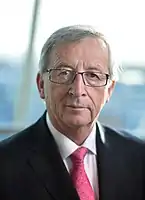 | |
| Date formed | 1 November 2014 |
| Date dissolved | 30 November 2019 |
| People and organisations | |
| President of the Commission | President Jean-Claude Juncker |
| Vice-President(s) of the Commission | First Vice President Frans Timmermans |
| No. of commissioners | 26 |
| Commissioners removed (Death/resignation/dismissal) | 4 |
| Total no. of commissioners | 30 |
| Member parties | |
| History | |
| Election(s) | 2014 European Parliament election |
| Predecessor | Barroso Commission |
| Successor | von der Leyen Commission |
.jpg.webp)
Election

In the 2014 parliamentary election, Juncker campaigned as the candidate of the European People's Party (EPP) for the presidency of the European Commission.[1] The EPP won a plurality in parliament, and on 27 June, the European Council nominated him for the post. Later on 15 July 2014, the European Parliament elected Juncker as the new Commission president.[2][3][4] On 22 October, the European Parliament approved the Juncker Commission in its entirety and during the 23–24 October 2014 meeting of the European Council the Council formally appointed the new Commission.[5][6] On 1 November 2014, the new Commission officially assumed office.[7][8] Juncker has outlined a ten-point agenda for his Presidency focusing on jobs and growth.[9]
Policy
Under the Juncker Commission, the EU General Data Protection Regulation was passed. The Commission co-developed the law, culminating in a trilogue proposal between the Commission, Parliament, and Council on 15 December 2015. The GDPR entered into force on 24 May 2016.[10]
Institutional reorganisation
Juncker made the Commission's work more top-down by strengthening the Secretariat-General in two ways. Firstly, he gave it a gatekeeper function regarding new initiatives. All "major initiatives" must henceforth be approved by the "relevant Vice-President(s) and the First Vice-President, unless they are initiated directly by the President". Secondly, the SG was made chair of all inter-service steering groups (ISGs) dealing with priority initiatives in the Commission's work programme.[11]:9-10 [12]:8-9
Juncker also abolished the position of Commissioner for Climate Action, merging it with the energy portfolio, to improve cooperation between staff in the Directorate-General (DG) Energy and the former DG Climate Action.[12]:10
Commissioners
The following college of commissioners serves under Juncker's presidency:[13][14][15]
- Parties
European People's Party (14) Party of European Socialists (7) Alliance of Liberals and Democrats for Europe (4) None (1)
 | ||||||||
| Juncker Commission | ||||||||
| Confirmation by the European Parliament on October 22, 2014 • Appointment by the European Council on October 23, 2014 | ||||||||
| Portfolio | Designee | Portfolio | Designee | Portfolio | Designee | |||
| President – Nomination June 27, 2014 Elected July 15, 2014 Took office November 1, 2014 |
 Former Prime Minister Jean-Claude Juncker of |
First Vice-President Better Regulation, Inter-Institutional Relations, Rule of Law and Charter of Fundamental Rights – Confirmation October 22, 2014 Took office November 1, 2014 |
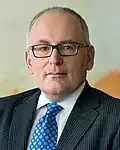 Former Minister of Foreign Affairs Frans Timmermans of the |
Vice-President and High Representative of the EU for Foreign Affairs and Security Policy |
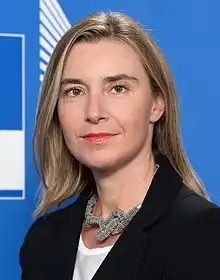 Former Minister of Foreign Affairs Federica Mogherini of | |||
| Vice-President Energy Union – Confirmation October 22, 2014 Took office November 1, 2014 |
.jpg.webp) Former European Commissioner Maroš Šefčovič of |
Vice-President Jobs, Growth, Investment and Competitiveness – Confirmation October 22, 2014 Took office November 1, 2014 |
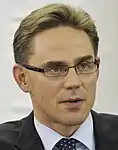 Former Prime Minister Jyrki Katainen of |
Vice-President Euro and Social Dialogue and Financial Stability, Financial Services and Capital Markets Union – Confirmation October 22, 2014 Took office November 1, 2014 |
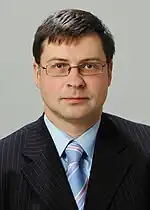 Former Prime Minister Valdis Dombrovskis of | |||
| European Commissioner Justice and Consumers – Confirmation October 22, 2014 Took office November 1, 2014 |
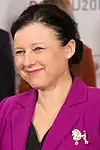 Former Minister of Development Věra Jourová of |
European Commissioner Digital Economy and Society – Announced May 10, 2017 Took office July 7, 2017 |
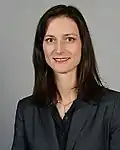 Former MEP Mariya Gabriel of |
European Commissioner Budget and Human Resources – Confirmation October 22, 2014 Took office November 1, 2014 |
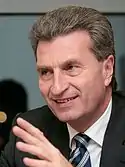 Former Minister President Günther Oettinger of | |||
| European Commissioner Economic and Financial Affairs, Taxation and Customs – Confirmation October 22, 2014 Took office November 1, 2014 |
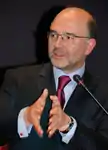 Former Minister of Finance Pierre Moscovici of |
European Commissioner Employment, Social Affairs, Skills and Labour Mobility – Confirmation October 22, 2014 Took office November 1, 2014 |
.jpg.webp) Former MEP Marianne Thyssen of |
European Commissioner European Neighbourhood Policy and Enlargement Negotiations – Confirmation October 22, 2014 Took office November 1, 2014 |
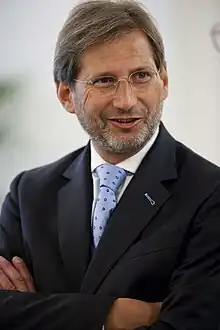 Former European Commissioner Johannes Hahn of | |||
| European Commissioner Migration, Home Affairs and Citizenship – Confirmation October 22, 2014 Took office November 1, 2014 |
.jpg.webp) Former Minister of Foreign Affairs Dimitris Avramopoulos of |
European Commissioner Health and Food Safety – Confirmation October 22, 2014 Took office November 1, 2014 |
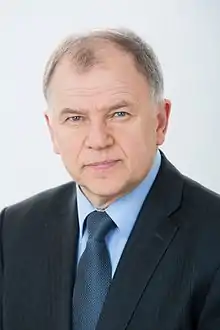
Former Minister of Health |
European Commissioner Security Union – Confirmation September 15, 2016 Took office September 19, 2016 |
.JPG.webp) Former Ambassador Julian King of (None) | |||
| European Commissioner Internal Market, Industry, Entrepreneurship and SMEs – Confirmation October 22, 2014 Took office November 1, 2014 |
 Former Deputy Prime Minister Elżbieta Bieńkowska of |
European Commissioner Climate Action and Energy – Confirmation October 22, 2014 Took office November 1, 2014 |
.jpg.webp) Former Minister of Agriculture Miguel Arias Cañete of |
European Commissioner International Cooperation and Development – Confirmation October 22, 2014 Took office November 1, 2014 |
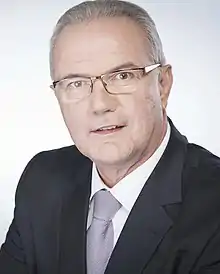 Former Deputy Prime Minister Neven Mimica of | |||
| European Commissioner Competition – Confirmation October 22, 2014 Took office November 1, 2014 |
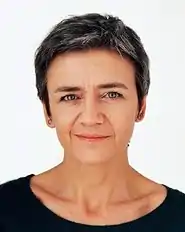 Former Deputy Prime Minister Margrethe Vestager of |
European Commissioner Transport – Confirmation October 22, 2014 Took office November 1, 2014 |
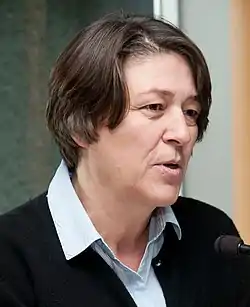 Former Deputy Prime Minister Violeta Bulc of |
European Commissioner Trade – Confirmation October 22, 2014 Took office November 1, 2014 |
 Former Minister of EU Affairs Cecilia Malmström of | |||
| European Commissioner Environment, Maritime Affairs and Fisheries – Confirmation October 22, 2014 Took office November 1, 2014 |
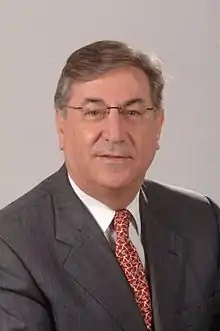 Former Minister of Tourism Karmenu Vella of |
European Commissioner Education, Culture, Youth and Sport – Confirmation October 22, 2014 Took office November 1, 2014 |
 Former Deputy Prime Minister Tibor Navracsics of |
European Commissioner Research, Science and Innovation – Confirmation October 22, 2014 Took office November 1, 2014 |
.JPG.webp) Former Under-Secretary of State Carlos Moedas of | |||
| European Commissioner Agriculture and Rural Development – Confirmation October 22, 2014 Took office November 1, 2014 |
._Arrivals_Phil_Hogan_(37038231115)_(cropped).jpg.webp) Former Minister of Environment Phil Hogan of |
European Commissioner Humanitarian Aid and Crisis Management – Confirmation October 22, 2014 Took office November 1, 2014 |
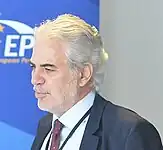 Former MEP Christos Stylianides of | |||||
Former members
| Nominee | Portrait | Portfolio | State | Party | |
|---|---|---|---|---|---|
| Andrus Ansip[16] | 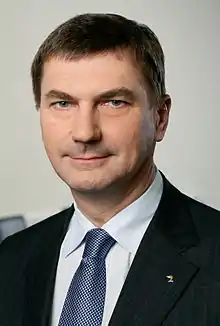 |
Digital Single Market (Vice President) | ALDE National: ERP | ||
| Corina Crețu[17] | 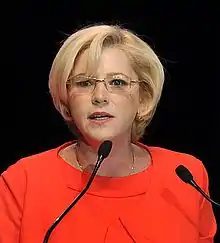 |
Regional Policy | PES (Before 2019) National: PSD (Before 2019) | ||
| EDP (2019) National: PRO (2019) | |||||
| Jonathan Hill[18] |  |
Financial Stability, Financial Services and Capital Markets Union | AECR National: Conservative | ||
| Kristalina Georgieva[19] | .jpg.webp) |
Budget and Human Resources (Vice President) | EPP National: GERB |
President's cabinet
The President's cabinet supports the President of the commission, and thus has a very central role in coordinating the work of the European Commission as a whole. The president's cabinet is led by Clara Martinez Alberola. Formerly, it was led by Martin Selmayr, who has been described as "the most powerful EU chief of staff ever."[20]
Project teams
Juncker has for the first time proposed a commission that clusters certain members together under designated policy areas. These clusters are known as "Project Teams" and will each be headed by one of the vice presidents.[21] Each team is composed of a core membership in addition to members who may fall under its respective umbrella as needed.[22] Timmermans and Georgieva both oversee all commissioners while the remaining five project teams are as follows:
A Connected Digital Single Market
- Vice President: Andrus Ansip (Digital Single Market)
- Elżbieta Bieńkowska (Internal Market, Industry, Entrepreneurship and SMEs)
- Corina Crețu (Regional Policy)
- Phil Hogan (Agriculture and Rural Development)
- Věra Jourová (Justice, Consumers and Gender Equality)
- Pierre Moscovici (Economic and Financial Affairs, Taxation and Customs)
- Günther Oettinger (Digital Economy and Society)
- Marianne Thyssen (Employment, Social Affairs, Skills and Labour Mobility)
- Vytenis Andriukaitis (Health and Food Safety)
- Jonathan Hill/Valdis Dombrovskis (Financial Stability, Financial Services and Capital Markets Union)
- Carlos Moedas (Research, Science and Innovation)
- Tibor Navracsics (Education, Culture, Youth and Sport)
- Margrethe Vestager (Competition)
A Deeper and Fairer Economic and Monetary Union
- Vice President: Valdis Dombrovskis (Euro and Social Dialogue)
- Elżbieta Bieńkowska (Internal Market, Industry, Entrepreneurship and SMEs)
- Corina Crețu (Regional Policy)
- Věra Jourová (Justice, Consumers and Gender Equality)
- Jonathan Hill/Valdis Dombrovskis (Financial Stability, Financial Services and Capital Markets Union)
- Pierre Moscovici (Economic and Financial Affairs, Taxation and Customs)
- Tibor Navracsics (Education, Culture, Youth and Sport)
- Marianne Thyssen (Employment, Social Affairs, Skills and Labour Mobility)
A New Boost for Jobs, Growth and Investment
- Vice President: Jyrki Katainen (Jobs, Growth, Investment and Competitiveness)
- Elżbieta Bieńkowska (Internal Market, Industry, Entrepreneurship and SMEs)
- Miguel Arias Cañete (Climate Action and Energy)
- Corina Crețu (Regional Policy)
- Jonathan Hill/Valdis Dombrovskis (Financial Stability, Financial Services and Capital Markets Union)
- Pierre Moscovici (Economic and Financial Affairs, Taxation and Customs)
- Günther Oettinger (Digital Economy and Society)
- Violeta Bulc (Transport)
- Marianne Thyssen (Employment, Social Affairs, Skills and Labour Mobility)
- Vytenis Andriukaitis (Health and Food Safety)
- Dimitris Avramopoulos (Migration, Home Affairs and Citizenship)
- Johannes Hahn (European Neighbourhood Policy and Enlargement Negotiations)
- Phil Hogan (Agriculture and Rural Development)
- Věra Jourová (Justice, Consumers and Gender Equality)
- Cecilia Malmström (Trade)
- Carlos Moedas (Research, Science and Innovation)
- Tibor Navracsics (Education, Culture, Youth and Sport)
- Karmenu Vella (Environment, Maritime Affairs and Fisheries)
- Margrethe Vestager (Competition)
A Resilient Energy Union with a Forward-Looking Climate Change Policy
- Vice President: Maroš Šefčovič (Energy Union)
- Elżbieta Bieńkowska (Internal Market, Industry, Entrepreneurship and SMEs)
- Miguel Arias Cañete (Climate Action and Energy)
- Corina Crețu (Regional Policy)
- Phil Hogan (Agriculture and Rural Development)
- Karmenu Vella (Environment, Maritime Affairs and Fisheries)
- Carlos Moedas (Research, Science and Innovation)
- Violeta Bulc (Transport)
- Věra Jourová (Justice, Consumers and Gender Equality)
- Cecilia Malmström (Trade)
- Günther Oettinger (Digital Economy and Society)
- Pierre Moscovici (Economic and Financial Affairs, Taxation and Customs)
- Marianne Thyssen (Employment, Social Affairs, Skills and Labour Mobility)
- Margrethe Vestager (Competition)
A Stronger Global Actor
- Vice President: Federica Mogherini (Foreign Affairs and Security Policy)
- Johannes Hahn (European Neighbourhood Policy and Enlargement Negotiations)
- Cecilia Malmström (Trade)
- Neven Mimica (International Cooperation and Development)
- Christos Stylianides (Humanitarian Aid and Crisis Management)
- Dimitris Avramopoulos (Migration, Home Affairs and Citizenship)
- Miguel Arias Cañete (Climate Action and Energy)
- Violeta Bulc (Transport)
A European Agenda on Migration
In 2015, when European migrant crisis unfolded, new project team was formed.[23]
- First Vice President: Frans Timmermans (Better Regulation, Interinstitutional Relations, the Rule of Law and the Charter of Fundamental Rights)
- Federica Mogherini (Foreign Affairs and Security Policy)
- Dimitris Avramopoulos (Migration, Home Affairs and Citizenship)
- Johannes Hahn (European Neighbourhood Policy and Enlargement Negotiations)
- Neven Mimica (International Cooperation and Development)
- Christos Stylianides (Humanitarian Aid and Crisis Management)
- Věra Jourová (Justice, Consumers and Gender Equality)
- Julian King (Security Union)[24]
References
- "Jean-Claude Juncker: Experience. Solidarity. Future". European People's Party. Archived from the original on 2020-11-17. Retrieved 2019-04-17.
- Parliament elects ‘politically ecumenical’ Juncker as Commission President EurActiv
- Blow to Cameron as centrist MEPs back Juncker for European commission job The Guardian
- Baker, Luke (2014-06-23). "Battle over Juncker underlines EU parliament's 'adulthood' | Reuters". Uk.reuters.com. Retrieved 2016-05-04.
- "EUROPEAN COUNCIL DECISION appointing the European Commission" (PDF). European Council. 22 October 2014. Archived from the original (PDF) on 2 November 2014. Retrieved 2 November 2014.
- "European Council (23 and 24 October 2014) ‒ Conclusions" (PDF). European Council. 24 October 2014. Retrieved 2 November 2014.
- "The new European Commission – Parliament elects new European Commission". European Parliament. 23 October 2014. Retrieved 1 November 2014.
- "Juncker Commission takes office". European Commission. 1 November 2014. Retrieved 1 November 2014.
- Jean-Claude Juncker: My Agenda for Jobs, Growth, Fairness and Democratic Change Archived 2019-10-30 at the Wayback Machine The Parliament Magazine
- "The History of the General Data Protection Regulation | European Data Protection Supervisor". edps.europa.eu. Retrieved 2022-11-19.
- Bürgin, Alexander (2018). "Intra- and Inter-Institutional Leadership of the European Commission President: An Assessment of Juncker's Organizational Reforms: Leadership of Commission President". JCMS: Journal of Common Market Studies. 56 (4): 837–853. doi:10.1111/jcms.12648. S2CID 158993394.
- Bürgin, Alexander (2020). "The impact of Juncker's reorganization of the European Commission on the internal policy‐making process: Evidence from the Energy Union project". Public Administration. 98 (2): 378–391. doi:10.1111/padm.12388. ISSN 0033-3298.
- Cerulus, Laurens (July 10, 2014). "Juncker wants more women in new Commission team".
- "Poland, Italy nominations leave Juncker needing four more commissioners". Euractiv.com. Retrieved 2016-05-04.
- EU Commission College Archived 2014-09-13 at the Wayback Machine
- Ansip served until 1 July 2019.
- Crețu served until 1 July 2019.
- Hill served until 15 July 2016.
- Georgieva served until 31 December 2016.
- HERSZENHORN, DAVID M. (17 Nov 2016). "'Monster' at the Berlaymont". Politico. Retrieved 3 May 2017.
- Vice-presidents to lead teams of commissioners
- The new structure of the Juncker Commission
- Juncker Commission. One year on
- President Juncker consults the European Parliament on Sir Julian King as Commissioner for the Security Union